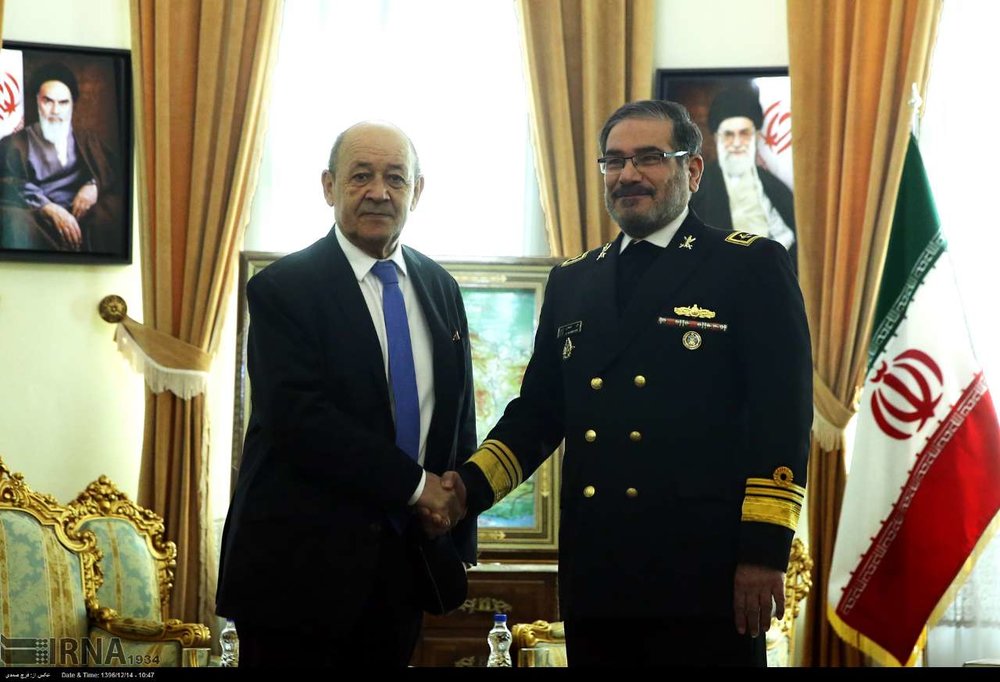Iran to Le Drian: Missiles are for deterrence

TEHRAN – In separate meetings with the French Foreign Minister Jean-Yves Le Drian in Tehran on Monday, Supreme National Security Council Ali Shamkhani and Foreign Minister Mohammad Javad Zarif insisted on Iran’s long-held policy that Tehran’s missile program is defensive.
Shamkhani said boosting defense capability, especially missile power, is an “unavoidable necessity” in line with implementing deterrent policies.
Shamkhani also told Le Drian that Iran’s defense capabilities pose no threat against any country.
‘Appeasing Trump to stay in JCPOA is wrong’
Reports have surfaced that European countries, including France, are pressing Iran to limit its missile program in order to keep the Trump White House in the 2015 nuclear deal, officially known as the Joint Comprehensive Plan of Action.
“Europe’s policy in appeasing the U.S. to keep the country in the JCPOA is wrong and it means being passive and giving in to Trump’s psychological game,” Shamkhani noted.
In a statement on January 12, U.S. President Donald Trump gave Europeans only 120 days to agree to an overhaul of the nuclear agreement and said if the text of the nuclear deal is not revised he would unilaterally withdraw the U.S. from the agreement. Trump said the nuclear deal should include Iran’s defense program including missiles.
Shamkhani added that all signatories, including the United States, must remain committed to the international nuclear agreement and it is not acceptable to ask one signatory to remain in the deal.
The top security official added, “Failure to implement the JCPOA discredits international agreements and also logic of holding talks to settle global issues.”
Zarif: Saddam’s war against Iran proved we must rely on own military power
In his meeting with Foreign Minister Le Drian, Zarif also said Iran’s military power is for deterrence.
Zarif said during Saddam Hussein’s war against Iran in the 1980s foreigners refused to sell weapons to Iran to defend itself.
“Iran has learned from the bitter experience of the imposed war that it must rely on its deterrence power to defend the people,” Zarif asserted.
During the 1980-1988 Iran-Iraq War, the Saddam army rained down missile on Iranian cities. The Saddam army also gassed Iranian soldiers and civilians. During the war France and the Soviet Union were the main arms suppliers to Iraq’s Saddam Hussein.

Zarif also said Iran’s missile program is not included in the JCPOA and the UN Security Council resolution 2231 which confirmed the JCPOA.
The resolution calls on Iran not to test missiles capable of carrying nuclear warheads.
The chief Iranian diplomat also urged the European countries to play more “constructive role” in protecting the JCPOA which he described as an “international achievement”.
Zarif went on to say that the U.S. is playing “illogical political games” regarding the nuclear deal.
He added that the European countries should fully implement their obligations and push the U.S. to remain committed to the accord.
The European countries should not let the U.S. make “illogical” and “illegal” demands in addition to violating its obligations, Zarif pointed out.
Le Drian said that France is determined to implement and protect the nuclear deal.
He added that France seeks continuation of friendly ties with Iran.
Le Drian: France opposes U.S. position toward nuclear deal
In his talks with Shamkhani, the French foreign minister also praised Iran’s commitment to its obligations under the JCPOA.
“French government highlights the necessity of being committed to the JCPOA and opposes the U.S. position which will make the international deal fragile,” Le Drian stated.
Iran, the five permanent members of the UN Security Council - the U.S., UK, France, Russia, and China - Germany and the European Union struck the nuclear deal on July 14, 2015. The deal took effect in January 2016.
According to the nuclear agreement, Iran agreed to lower its nuclear work in exchange for termination of financial and economic sanctions.
Since the nuclear deal went into force the International Atomic Energy Agency has issued ten reports confirming Iran’s compliance with its commitments.
‘Bright prospect in ties’
On bilateral relations, Shamkhani told the French foreign minister that Iran welcomes removal of banking impediments to expand economic ties.
For his part, Le Drian said that new strategies to expand banking relations will be announced soon.
He added that there is a “bright prospect” for political and economic ties between the two countries in the post-JCPOA atmosphere.
Shamkhani criticizes France on MKO
Elsewhere, Shamkhani criticized France for hosting Mojahedin Khalq Organization, a terrorist group, and allowing them to be active in Paris.
“Lack of efforts to counter terrorist groups, which has killed thousands of innocent Iranians, in Paris is contrary to France’s international responsibility in fighting terrorism and does not help expansion of relations between the two countries,” Shamkhani remarked.
NA/PA
